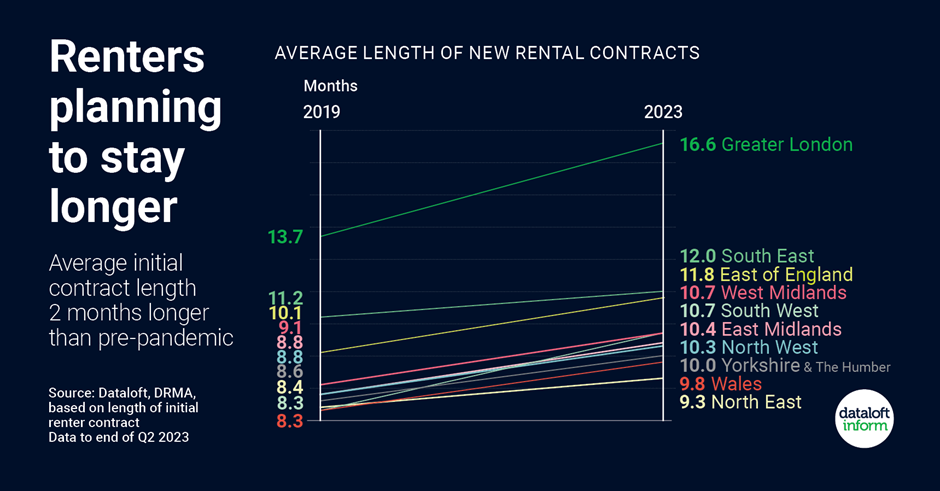The Increasing Duration of Rental Periods
As the UK property market continues to evolve, a new trend is emerging. Renters, it seems, are looking to set down roots in their rented properties for longer durations. The Dataloft Inform data for Q2 2023 throws light on this recent shift. In this article, we’ll dive deeper into the data and explore the potential reasons driving this change.

Initial Rental Contracts: An Extension in Duration
Historically, the rental market witnessed initial rental contracts averaging around 10.5 months during Q2 2019. Fast forward to Q2 2023, and this number has seen a significant bump up to 12.7 months. Such an increase can’t merely be brushed off as a statistical anomaly; there’s more at play here.
One of the major factors cited is the existing low levels of stock, which inevitably leads to rising rents in the open market. When potential renters are faced with limited choices, they’re more inclined to stay put, especially if their current living situation is satisfactory. Rising rents, on the other hand, act as a deterrent for those considering a move.
The London Scenario: Tight Competition and Long-Term Stays
Nowhere is the trend more evident than in the bustling metropolis of London. The city’s rental market is renowned for its fierce competition. As demand perennially outstrips supply, renters find themselves in a high-stakes race to secure a property that aligns with their needs and budget.
In such a climate, it’s hardly surprising that renters in London are leaning towards long-term stays. Once they’ve secured a property, the thought of re-entering the competitive rental market is daunting, to say the least. Hence, tenants tend to prolong their stay, enjoying the stability amidst the ever-fluctuating market.
The Impact of the Renters (Reform) Bill
Recent legislative proposals also seem to be playing a pivotal role in influencing the rental duration. The Renters (Reform) Bill, which has been making headlines, proposes a significant change: the cessation of fixed term Assured Shorthold Tenancies (ASTs).
The idea behind this is to introduce open-ended renter contracts, ensuring greater flexibility for renters. Without the constraint of a fixed term, renters can enjoy more autonomy in deciding the length of their stay. This not only reduces the hassle of frequent moves but also gives them a sense of security and continuity.
The Way Forward: A New Rental Landscape
What does this mean for landlords and estate agents? While the longer rental periods might appear as reduced opportunities for new lettings, they offer a different advantage: stability. With tenants staying longer, the turnover is reduced, which can lead to consistent rental income and fewer void periods.
For tenants, longer stays can mean a stronger sense of community, familiarity, and the chance to truly make a rental property feel like home. With fewer worries about imminent moves, they can invest time, effort, and even money into their living spaces.
Embracing the Change
For agents and landlords alike, it’s time to adapt and embrace this new landscape. While the focus has traditionally been on frequent lettings, the emphasis should now shift to long-term tenant satisfaction and retention. Happy tenants who feel secure and valued are more likely to stay put. Offering services, resources, and advice that help renters make the most of their long-term stays could be the way forward.
If you’re a landlord eager to understand these market shifts and how they impact you, get in touch with our team today. We’re here to guide, advise, and ensure you’re well-prepared for the changing tides of the rental market.






